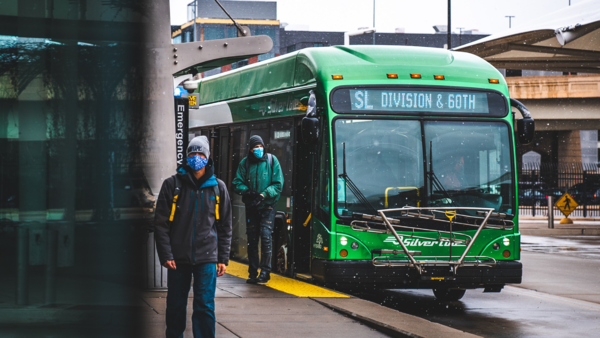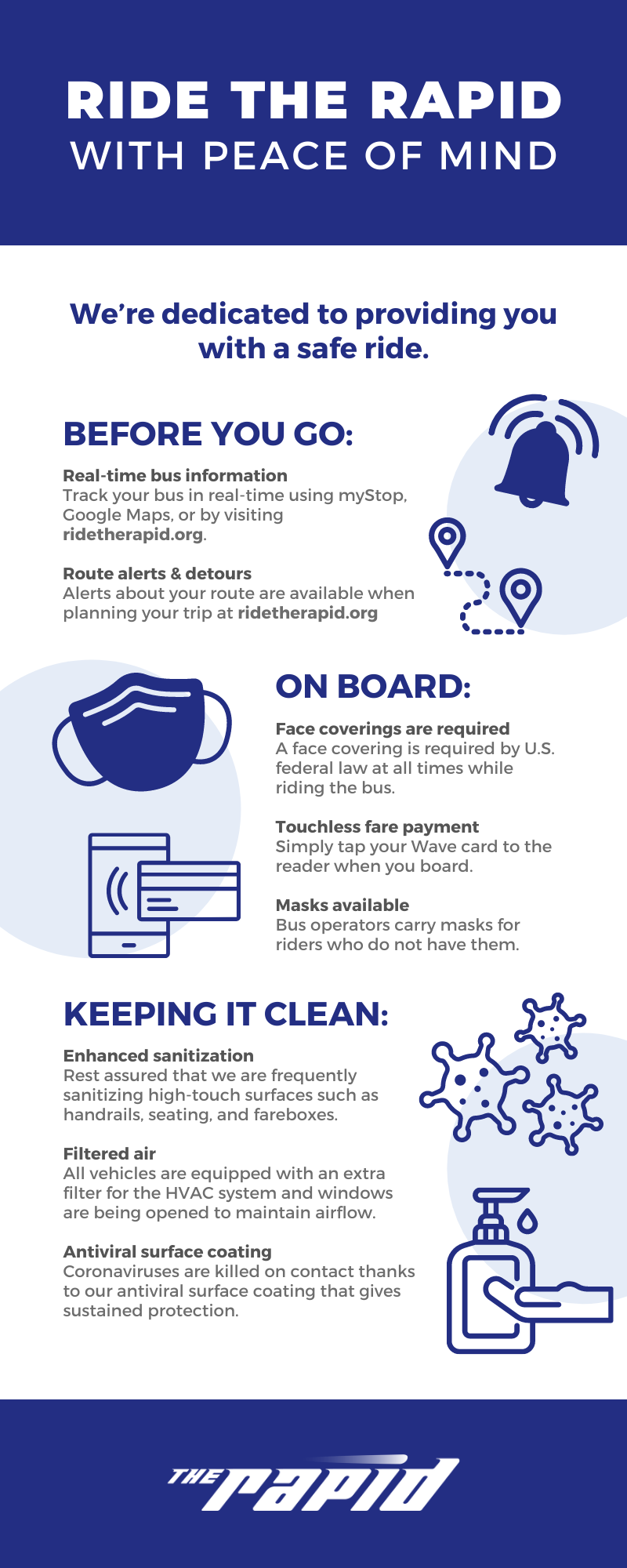COVID-19 & Transit
 The Rapid is always working to provide the safest possible public transportation service to the community, especially as we continue to navigate this pandemic together.
The Rapid is always working to provide the safest possible public transportation service to the community, especially as we continue to navigate this pandemic together.
This page is your source for all COVID-19 related information, including service updates, health and safety protocols, and other critical details.
We will continue to implement safety and cleaning practices in accordance with local, state, and federal guidelines, and we are continually assessing these protocols for efficiency and effectiveness.
Keeping Transit Safe During COVID-19
What is The Rapid doing to ensure the health and safety of its riders and employees?
In accordance with federal law, we require bus operators and riders to wear masks.
Our bus operators are provided with masks, face shields, and gloves during their shifts. All riders that are medically able must wear a mask while utilizing our service.
We clean and disinfect all our vehicles every night.
An approved antiseptic agent (Spartan Clean On The Go hdqC2), ultraviolet-C (UVC) light, electrostatic spraying, and high-temperature steam cleaning (approximately 300 degrees Fahrenheit) is used in all service vehicles nightly to eradicate any potential human coronavirus contamination.
We regularly clean our office spaces and require daily employee screening.
Our office spaces are disinfected twice per week with Spartan Clean On The Go hdqC2 and UVC light, and all employees are required to complete a self-assessment screening (temperature, symptoms, and exposure check) before coming to work.
What are the next steps The Rapid is taking to maximize safety efforts?
We are treating all vehicles and facilities with an anti-microbial agent that will prevent the growth and survival of viruses, germs, micro-organisms, etc.
- The product, AEGIS®, can protect surfaces for an extended period of time (up to 12 months)
- The Rapid will test surfaces treated with this product monthly for the presence of enzymes that indicate contamination
- Daily and nightly cleaning and disinfection will continue to take place in addition to the use of this product
- All vehicles are on a rolling deep-clean schedule (10 are deep cleaned every week)
Download our safety guide here (87 KB, PDF).
The Rapid is taking the following measures
- Following CDC and WHO guidelines for preventative practices
- Remaining in contact with Kent County Health Department and Emergency Operations Center, the City of Grand Rapids Emergency Operations Center, and emergency personnel in East Grand Rapids, Grandville, Kentwood, Walker and Wyoming
- Procuring additional cleaning supplies and equipment and adapting cleaning procedures
- Nightly disinfection and steam cleaning of vehicles utilizing with an approved antiseptic agent on all surfaces throughout the entire vehicle interior.
-
Additional cleaning of buses during service (between runs) occurs at Rapid Central Station and Kentwood Station from 6:00 am to 10:00 am and from 2:00 pm to 6:00 pm (peak times). Cleaning personnel at the station locations focus disinfectant wiping on all high-contact surfaces.
- Treating all vehicles and facilities with an anti-microbial agent that will prevent the growth and survival of viruses, germs, micro-organisms, etc. The Rapid will test surfaces treated with this product monthly for the presence of enzymes that indicate contamination.
- Closure of all public facilities such as Rapid Central Station and the Vernon J. Ehlers Amtrak Station
- Producing and sharing CDC guidelines for preventative practices on The Rapid’s vehicles, as well as overhead announcements in both Spanish and English
How you can protect yourself against COVID-19
During this pandemic, we ask that riders limit their usage of The Rapid to only essential travel.
The Centers for Disease Control and Prevention (CDC) recommends these precautions to protect against COVID-19, and we urge our riders to follow them:
- Wash your hands often with soap and water for at least 20 seconds especially after you have been in a public place, or after blowing your nose, coughing, or sneezing.
- If soap and water are not readily available, use a hand sanitizer that contains at least 60% alcohol. Cover all surfaces of your hands and rub them together until they feel dry.
- Avoid touching your eyes, nose, and mouth with unwashed hands.
- Cover your cough or sneeze with a tissue, then throw the tissue in the trash.
- Stay home if you are sick.
- Put distance between yourself and other people on the bus (six feet is recommended), this also includes the Bus Operator. Many people are staying home now, so this has become easier to do.
- Wear a covering snuggly over your nose and mouth.
- Get your COVID-19 vaccine.
- If you see an unhygienic surface on the bus or at a shelter, report it to the operator, another transit employee, or call customer service at 616-776-1100.


